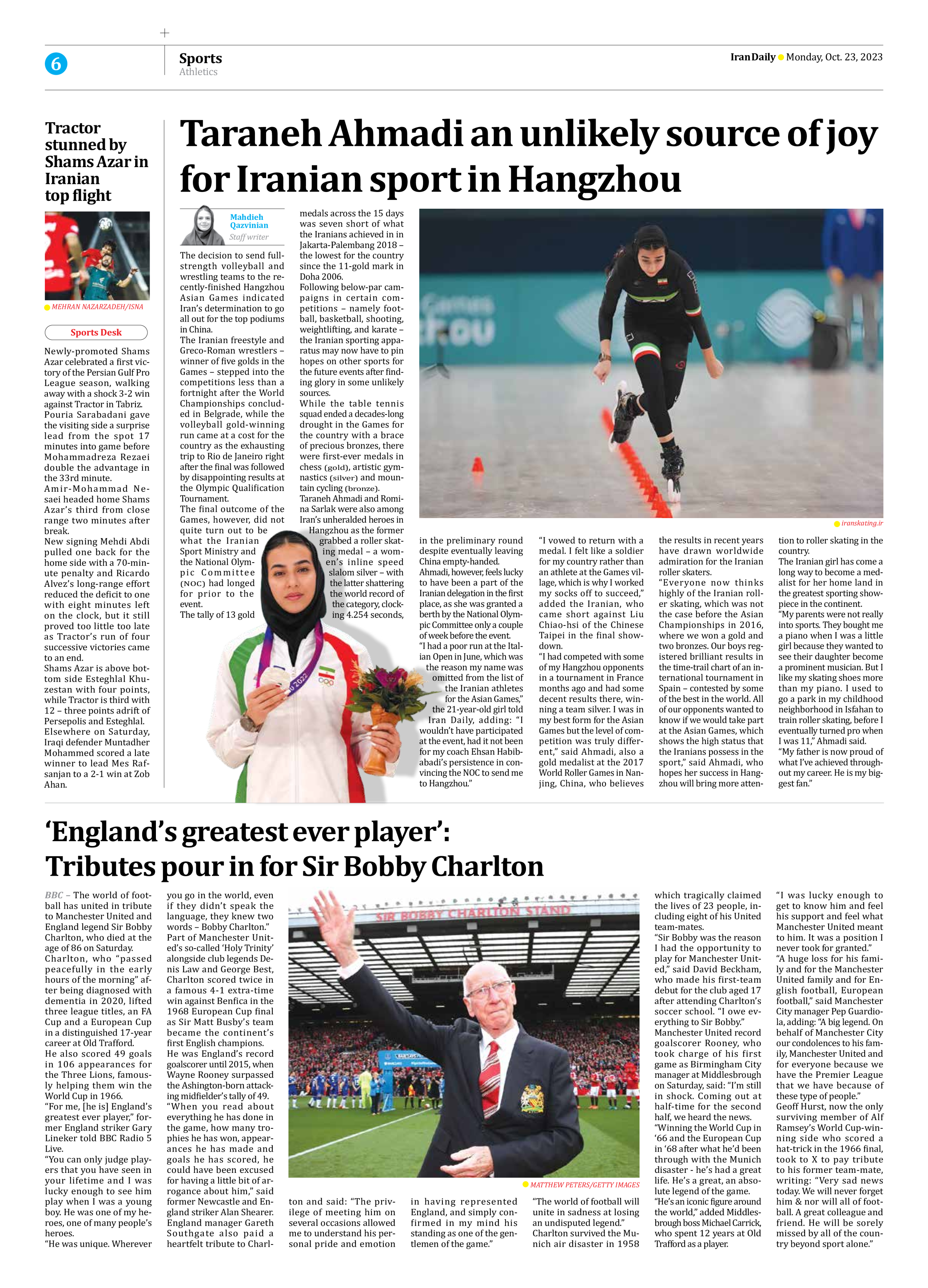
Taraneh Ahmadi an unlikely source of joy for Iranian sport in Hangzhou
Mahdieh Qazvinian
Staff writer
The decision to send full-strength volleyball and wrestling teams to the recently-finished Hangzhou Asian Games indicated Iran’s determination to go all out for the top podiums in China.
The Iranian freestyle and Greco-Roman wrestlers – winner of five golds in the Games – stepped into the competitions less than a fortnight after the World Championships concluded in Belgrade, while the volleyball gold-winning run came at a cost for the country as the exhausting trip to Rio de Janeiro right after the final was followed by disappointing results at the Olympic Qualification Tournament.
The final outcome of the Games, however, did not quite turn out to be what the Iranian Sport Ministry and the National Olympic Committee (NOC) had longed for prior to the event.
The tally of 13 gold medals across the 15 days was seven short of what the Iranians achieved in in Jakarta-Palembang 2018 – the lowest for the country since the 11-gold mark in Doha 2006.
Following below-par campaigns in certain competitions – namely football, basketball, shooting, weightlifting, and karate – the Iranian sporting apparatus may now have to pin hopes on other sports for the future events after finding glory in some unlikely sources.
While the table tennis squad ended a decades-long drought in the Games for the country with a brace of precious bronzes, there were first-ever medals in chess (gold), artistic gymnastics (silver) and mountain cycling (bronze).
Taraneh Ahmadi and Romina Sarlak were also among Iran’s unheralded heroes in Hangzhou as the former grabbed a roller skating medal – a women’s inline speed slalom silver – with the latter shattering the world record of the category, clocking 4.254 seconds, in the preliminary round despite eventually leaving China empty-handed.
Ahmadi, however, feels lucky to have been a part of the Iranian delegation in the first place, as she was granted a berth by the National Olympic Committee only a couple of week before the event.
“I had a poor run at the Italian Open in June, which was the reason my name was omitted from the list of the Iranian athletes for the Asian Games,” the 21-year-old girl told Iran Daily, adding: “I wouldn’t have participated at the event, had it not been for my coach Ehsan Habibabadi’s persistence in convincing the NOC to send me to Hangzhou.”
“I vowed to return with a medal. I felt like a soldier for my country rather than an athlete at the Games village, which is why I worked my socks off to succeed,” added the Iranian, who came short against Liu Chiao-hsi of the Chinese Taipei in the final showdown.
“I had competed with some of my Hangzhou opponents in a tournament in France months ago and had some decent results there, winning a team silver. I was in my best form for the Asian Games but the level of competition was truly different,” said Ahmadi, also a gold medalist at the 2017 World Roller Games in Nanjing, China, who believes the results in recent years have drawn worldwide admiration for the Iranian roller skaters.
“Everyone now thinks highly of the Iranian roller skating, which was not the case before the Asian Championships in 2016, where we won a gold and two bronzes. Our boys registered brilliant results in the time-trail chart of an international tournament in Spain – contested by some of the best in the world. All of our opponents wanted to know if we would take part at the Asian Games, which shows the high status that the Iranians possess in the sport,” said Ahmadi, who hopes her success in Hangzhou will bring more attention to roller skating in the country.
The Iranian girl has come a long way to become a medalist for her home land in the greatest sporting showpiece in the continent.
“My parents were not really into sports. They bought me a piano when I was a little girl because they wanted to see their daughter become a prominent musician. But I like my skating shoes more than my piano. I used to go a park in my childhood neighborhood in Isfahan to train roller skating, before I eventually turned pro when I was 11,” Ahmadi said.
“My father is now proud of what I’ve achieved throughout my career. He is my biggest fan.”







